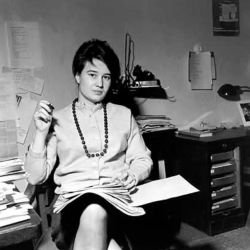
Ulrike Meinhof
| Date of Birth | : | 07 Oct, 1934 |
| Date of Death | : | 09 May, 1976 |
| Place of Birth | : | Oldenburg, Germany |
| Profession | : | Journalist, Activist |
| Nationality | : | German |
Ulrike Marie Meinhof was a German left-wing journalist and founding member of the Red Army Faction in West Germany, commonly referred to in the press as the "Baader-Meinhof gang". She is the reputed author of The Urban Guerilla Concept.
Early Life
Meinhof was born in 1934 in Oldenburg. Her father Werner Meinhof, a curator of Jena Museum, died of cancer in 1940, causing her mother to take in a boarder, Renate Riemeck, to make money. In 1946, the family moved back to Oldenburg after Jena fell under Soviet occupation as a result of the Yalta agreement. Meinhof's mother, Ingeborg Meinhof, an art historian, began to work as a teacher and died from cancer in 1949. Riemeck took on the role of guardian of Meinhof and her elder sister, Wienke.
First specialized study of Meinhof and the RAF in English, focusing on their use of language to justify extreme violence.
In 1970 Ulrike Meinhof abandoned a career as a political journalist to join the Red Army Faction; captured as a terrorist along with other members of the group in 1972, she died an unexplained death in a high-security prison in 1976. A charismatic spokesperson for the RAF, she has often come near to being idealized as a freedom fighter, despite her use of extreme violence. In an effort to understand how terrorism takes root, Sarah Colvin seeks a dispassionate view of Meinhof and a period when West Germany was declaring its own "war on terror." Ulrike Meinhof always remained a writer, and this book focuses on the role of language in her development and that of the RAF: how Meinhof came to justify violence to the point of murder, creating an identity for the RAF as resistance fighters in an imagined state of war that was reinforced by the state's adoption of what Andreas Musolff has called "war terminology."But its all-powerful identity as a fighting group eroded the RAF's empathy with other human beings -- even those it once claimed to be "fighting for." It became a closed unit, self-justifying and immobilized by its own convictionthat everything it did must be right. This is the first specialized study of Meinhof and the RAF in English -- which is remarkable given the current interest in the topic in both Europe and the U.S.
Sarah Colvin is Professor and Eudo C. Mason Chair of the German Department at the University of Edinburgh, UK.
Death
On 9 May 1976, Meinhof was found dead in her prison cell in Stuttgart-Stammheim. The official verdict was Meinhof had committed suicide. It was later claimed that she had become increasingly isolated from other RAF prisoners. Notes exchanged between them in prison included one by Ensslin, describing her as "too weak". The official findings were not accepted by many in the RAF and other militant organisations, and there are still some who doubt their accuracy and believe that she was murdered by the authorities. A second investigation was carried out by an international group. The findings of the inquiry were published under the title Der Tod Ulrike Meinhof. Bericht der Internationalen Untersuchungskommission (The Death of Ulrike Meinhof. Report of the International Investigation Committee) in 1979.
Quotes
If you throw one stone, it’s a punishable offence. If 1,000 stones are thrown, it’s political action. If you set a car on fire, it’s a punishable offence. If hundreds of cars are set on fire, it’s political action. Protest is when I say I don’t agree with something. Resistance is when I ensure that things with which I disagree no longer take place.
Protest is when I say I don't like this. Resistance is when I put an end to what I don't like. Protest is when I say I refuse to go along with this anymore. Resistance is when I make sure everybody else stops going along too.
[ I provoke] the system [to] show its true face ... so that through its own acts of terrorism ... the masses will rise against it.
Anti-Semitism is really a hatred of capitalism.
These are the strategic dialectics of anti-imperialist struggle: through the defensive reactions of the system, the escalation of counterrevolution, the transformation of the political martial law into military martial law, the enemy betrays himself, becomes visible.
If one sets a car on fire, that is a criminal offence. If one sets hundreds of cars on fire, that is political action.
I can be a subversive element.
Protest is when I say...'I don't agree with something'.... Resistance is when I ensure that things with which I disagree no longer take place
Objection is when I say: this doesn't suit me. Resistance is when I make sure that what doesn't suit me never happens again.
Protest is when I say this does not please me. Resistance is when I ensure what does not please me occurs no more.
